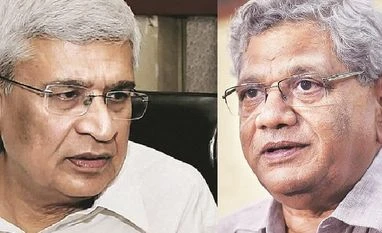At a time of plummeting legislative presence, but still robust peasants and workers organisations, the Communist Party India (Marxist), or CPI (M), will meet in Hyderabad from Tuesday to decide its electoral line for the next three years. Over the next six days, it might even vote to elect a new party chief.
Party sources claimed current party general secretary or chief, Sitaram Yechury was determined to contest if the rival camp, led by his predecessor Prakash Karat, fields former Tripura chief minister Manik Sarkar as the challenger.
The party conclave, termed ‘congress’, is held once in three years. The previous one in Vishakhapatnam, in April 2015, had elected Yechury to succeed Karat for a three-year term. A party general secretary is allowed three terms of three-year each, and Karat completed his in 2015.
At the deliberations in Hyderabad, the Karat camp is likely to highlight the ever-dwindling legislative presence of the CPI (M) in the last three years.
It would point to the CPI (M) not only losing the West Bengal assembly polls in 2016 but coming third. However, the CPI (M)-led Left Democratic Front wrested power from the Congress-led United Democratic Front in Kerala in 2017 assembly polls but lost its stronghold of Tripura to the Bharatiya Janata Party (BJP) in March 2018.
Yechury and his supporters are likely to defend the last three years as a resurgence of the CPI (M) and its affiliated organisations for being at the vanguard of raising people-centric issues. They would argue that the CPI (M) provided leadership to several mass movements, and the success of its students’ arm, the Students Federation of India, or SFI, in some of the recent students’ union elections in Jawaharlal Nehru University, Hyderabad Central University, and others.
In the last three years, as the Yechury camp would point out at the conclave, the All India Kisan Sabha, the CPI (M)’s peasants’ union, has led protests on issues of better price for farm produce and forest rights of tribals, in Maharashtra, Rajasthan, Karnataka, Madhya Pradesh and Telangana. Last month, the AIKS-led 'long march' for tribals and farmers from Nashik to Mumbai was noted across the country.
Similarly, its trade union arm, the CITU, has also organised several protests, while the CPI (M) has played a key role in bringing the left and Dalit organisations together to protest atrocities on Dalits, and when intellectuals returned their awards to protest lynchings in the name of cow protection.
For the past one year, the CPI (M) has been in the throes of a leadership battle between Yechury and Karat camps. The disagreement, apparently, is over the electoral line the party should take for the next three years, but particularly for the 2019 Lok Sabha elections.
The party conclave would vote on the new party line. Currently, the draft moved by Karat has the majority in the CPI (M) central committee, which is the party’s highest decision-making body.
But at the party conclave, any of the 750-delegates, who would attend from across India, can move an amendment to the final draft, which will then be put to vote. The delegates will also elect a new central committee, which in turn will either allow Yechury to continue or elect a new party chief.
On the issue of the electoral line, both Karat and Yechury agree on the need for “pooling” of anti-Bharatiya Janata Party (BJP) votes if the BJP-Rashtriya Swayamsevak Sangh has to be defeated in the 2019 Lok Sabha elections.
If the Karat camp is explicit in arguing against any truck with the Congress, Yechury’s line is for keeping the door open for electoral understanding with the Congress. However, Karat doesn’t reject the need for the party to have electoral understanding with the Congress in states like Tamil Nadu.
Karat, whose camp is principally backed by the powerful Kerala unit, has moved closer to the Yechury’s draft on the electoral line in recent months.
The disagreement, therefore, is more of nuance, and a façade for the personality clash between the two.
Unlock 30+ premium stories daily hand-picked by our editors, across devices on browser and app.
Pick your 5 favourite companies, get a daily email with all news updates on them.
Full access to our intuitive epaper - clip, save, share articles from any device; newspaper archives from 2006.
Preferential invites to Business Standard events.
Curated newsletters on markets, personal finance, policy & politics, start-ups, technology, and more.
)